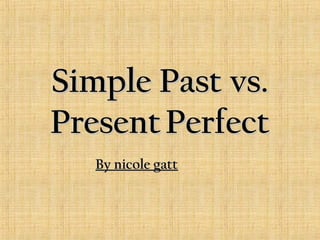
Simple Past vs. Present Perfect: Understanding the Difference
- 1. Simple Past vs.Simple Past vs. PresentPresent PerfectPerfect By nicole gattBy nicole gatt
- 2. Remember: Grammar has meaning!Grammar has meaning! Different grammar tenses are used inDifferent grammar tenses are used in different situations or contexts and theydifferent situations or contexts and they carry different meanings.carry different meanings. For example . . .For example . . .
- 3. • Use the simple past for action that happened in the past and is: overover,, donedone,, finishedfinished!! • Use the present perfect for action that started in the past, but . . . is still trueis still true today.today.
- 4. • TheThe simple past always refers to analways refers to an action or situation that isaction or situation that is finishedfinished.. • TheThe present perfect connectsconnects the pastthe past and the present. It is used to showand the present. It is used to show that an action or situation in thethat an action or situation in the past:past: -continues today, OR-continues today, OR -might happen again-might happen again
- 5. Compare theCompare the meaningmeaning ofof these two sentences:these two sentences: 1. Sara1. Sara livedlived in Boston for 5in Boston for 5 years.years. 2. Sara2. Sara has livedhas lived in Boston for 5in Boston for 5 years.years. The first sentence uses: Simple PastSimple Past The second sentence uses: Present PerfectPresent Perfect
- 6. SaraSara livedlived in Boston for 5 years.in Boston for 5 years. Meaning: by using the simple past tense,by using the simple past tense, we mean that Sara started living inwe mean that Sara started living in Boston 5 years ago . . .Boston 5 years ago . . . AND . . . then sheAND . . . then she movedmoved!! Now she lives in a different city, likeNow she lives in a different city, like Paris.Paris. Remember, the simple past is used for a situation that is over, finished, done!over, finished, done!
- 7. SaraSara has livedhas lived in Boston for 5 years.in Boston for 5 years. Meaning: by using the present perfectby using the present perfect tense, we mean that Sara began living intense, we mean that Sara began living in Boston 5 years ago . . .Boston 5 years ago . . . AND . . . sheAND . . . she stillstill lives there.lives there. Remember, present perfect: connects the past with the present.
- 8. • Use theUse the simplesimple pastpast with timewith time words like:words like: •yesterday •last Saturday, week, month, year, etc. •_______ ago •when I was… •in 1990 (past date) • Use theUse the presentpresent perfectperfect with timewith time words like:words like: •recently/lately •since … •so far this week, month, year, etc.
- 9. Additional notes aboutAdditional notes about present perfect:present perfect: • We often use present perfect to say thatWe often use present perfect to say that something happened sooner than expected.something happened sooner than expected. Example:Example: Jan: Don’t forget to mail that letter.Jan: Don’t forget to mail that letter. Tom: ITom: I’ve’ve alreadyalready mailedmailed it.it.
- 10. •We often use present perfect to say thatWe often use present perfect to say that we havewe have nevernever done something at anydone something at any time in the past.time in the past. Example:Example: II have never visitedhave never visited London. ButLondon. But someday, I hope to travel there.someday, I hope to travel there.
- 11. • We often use present perfect with theWe often use present perfect with the expression: “expression: “This is the first timeThis is the first time.”.” Example:Example: Leonard is nervous.Leonard is nervous. This is the first time heThis is the first time he has flownhas flown on an airplane!on an airplane!
- 12. •We often use present perfect with “ever”We often use present perfect with “ever” and “never.”and “never.” Example:Example: Patricia: Have you ever played tennis?Patricia: Have you ever played tennis? Linda: No, I’ve never played before, but ILinda: No, I’ve never played before, but I would like to learn!would like to learn!
- 13. Remember! If you are talking about a specificIf you are talking about a specific time in the past (yesterday, lasttime in the past (yesterday, last month, etc.), youmonth, etc.), you cannot use theuse the present perfect.present perfect. In these cases, use the simple past.
- 14. Practice! Do these exercises with your class.Do these exercises with your class. Choose the simple past or present perfect and talk about why each is necessary. 1. When I was a child, I ________ (swim) a lot.1. When I was a child, I ________ (swim) a lot. 2. So far this week, we ________ (study) a lot.2. So far this week, we ________ (study) a lot. 3. Theo __________ (be) very sick recently.3. Theo __________ (be) very sick recently. 4. I _________ (have) a terrible headache4. I _________ (have) a terrible headache yesterday.yesterday. 5. It ________ (rain) a lot lately.5. It ________ (rain) a lot lately. 6. They _______ (get) married ten years ago.6. They _______ (get) married ten years ago. 7. I ________ (be) to Balboa Park many times.7. I ________ (be) to Balboa Park many times. 8. My family ________ (take) a vacation last year.8. My family ________ (take) a vacation last year.
- 15. Answers! 1.1. When I was a child, I, I swam a lot.a lot. 2.2. So far this week, we, we have studied aa lot.lot. 3. Theo3. Theo has been very sickvery sick recently.. 4. I4. I had a terrible headachea terrible headache yesterday.. 5. It5. It has rained a lota lot lately.. 6. They6. They got marriedmarried ten years ago.. 7. I7. I have been to Balboa Parkto Balboa Park many times. (possibly again in the future) 8. My family8. My family took a vacationa vacation last year..
- 16. The end